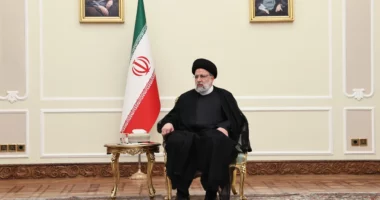The White House has delivered a stern caution to Congress, stressing that failure to approve funding could have severe repercussions for Ukraine, potentially crippling its defenses on the battlefield.
Despite the Biden administration’s persistent efforts to secure additional aid for the war-torn nation over several months, a recent letter on Monday has escalated the urgency, framing President Joe Biden’s stance as crucial for the destiny of global democracies.
Amidst a standoff within Congress over the allocation of funds to Ukraine, Shalanda Young, the Director of the Office of Management and Budget, emphasized in the letter that the United States is rapidly approaching a critical juncture. A failure to reach an agreement, she warned, would pose significant risks to national security.
“I want to underscore this: if Congress doesn’t act soon, by year-end, our ability to acquire more weaponry and gear for Ukraine, along with supplying equipment from US military stocks, will be depleted. There aren’t limitless funds available to tackle this situation. We are facing financial constraints and running out of time,” Young stated emphatically in her Monday letter to congressional leaders.
Young highlighted the perilous consequences of withholding funds, emphasizing that cutting off American weaponry and supplies would bolster the chances of Russian military successes. She underscored that continued support for Ukraine is pivotal in preventing a broader conflict in the region.
“I must emphasize that aiding Ukraine in defending itself and securing its future as an independent, democratic, sovereign, and prosperous nation aligns with our national security objectives,” she added.
Back in October, Biden had requested over $100 billion for national security purposes, with a significant portion earmarked for Ukraine ($61.4 billion) and Israel ($14.3 billion). He urged Congress to swiftly pass the supplementary bill, portraying it as a bipartisan, comprehensive agreement.
Furthermore, the administration’s proposal included $9.15 billion for humanitarian assistance, $7.4 billion for the Indo-Pacific region and Taiwan, and $13.6 billion to address border security issues along the US-Mexico border.
Senate Majority Leader Chuck Schumer had indicated in a letter to his Democratic peers in November that he intended to introduce a national security package imminently, linking the funding for Israel and Ukraine.
However, House Speaker Mike Johnson and Senate Minority Leader Mitch McConnell have stipulated that Republican support for increased Ukraine funding hinges on stricter immigration policies, particularly concerning security at the US-Mexico border. Schumer mentioned ongoing negotiations over the border component during the Thanksgiving break.
The border discussions in the Senate encountered a significant hurdle over the weekend as Democrats alleged that Republicans were advocating policies resembling the House’s immigration bill, HR2, too closely.
While it might not signify the complete breakdown of talks, insiders familiar with the negotiations told CNN that the discussions had hit a critical deadlock, potentially jeopardizing the passage of aid for Ukraine and Israel through both chambers of Congress.
Punchbowl News initially reported the deadlock.
A Democratic insider informed CNN that negotiations stalled when it became apparent that Republicans were advocating changes too akin to the House GOP’s immigration bill.
“We reached a point where this negotiation ceased to be productive,” remarked one Democratic source.





